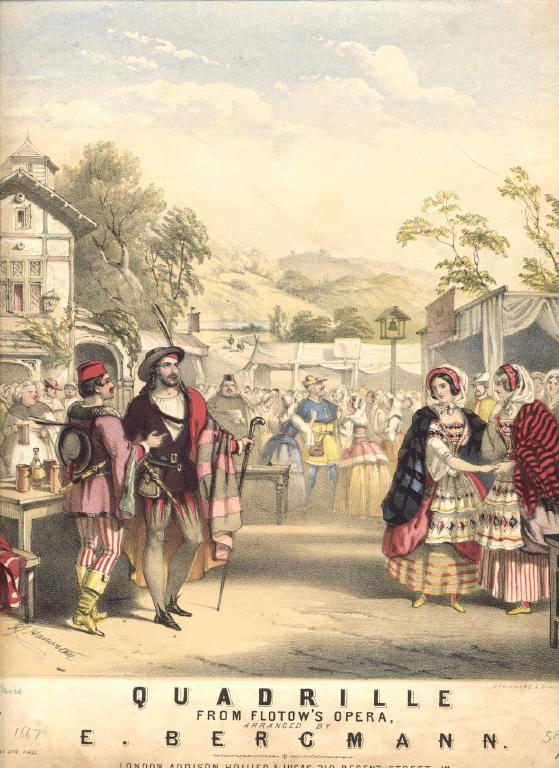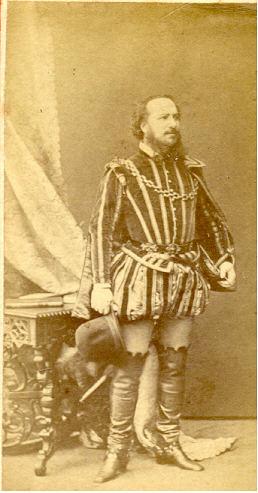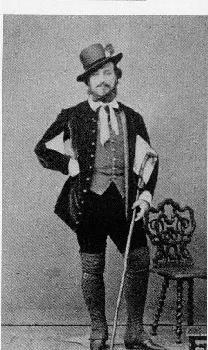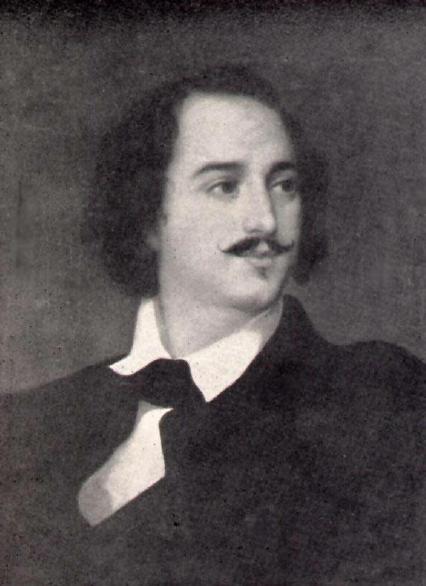Giovanni Mario
I wish to thank Thomas Silverbörg for the picture (bottom).
He was born into a noble family (his real name was Giovanni Matteo De Candia), and like his father, a general, he became an officer in the
Piedmontese army. When deployed to Genova, he associated himself with revolutionary, republican circles, which led to the break with his
family – and he made it irreversible by deserting in 1836, and after meeting his mother a last time – he was disguised as a
fisherman, she gave him money –, he eloped to Paris with a ballet dancer.
In Paris, he lived in bohemian conditions. He gave fencing and horseriding lessons, he made clay statuettes, and he soon became an
appreciated amateur singer of romances in private salons. Even Meyerbeer heard him, and strongly advised to study voice. And so the young
nobleman did, at the conservatory; among his teachers were Meyerbeer himself, Ponchard and Bordogni.
He hesitated when the Paris Opéra offered him a contract, but eventually accepted, changing his name into Giovanni Mario. He made
his debut as Robert le diable in late 1838 (the exact date is unclear); Meyerbeer even added a new aria for him on that occasion. Although
he had studied but briefly, and his training was not quite complete yet, his success was so great that he was immediately hired by Her
Majesty's Theatre in London; he appeared in Lucrezia Borgia there in June 1839, together with the famous soprano Giulia Grisi, who
became his wife five years later. The British press chided him for his less than perfect vocal technique, but appreciated his fascinating
stage presence and his musical taste and style.
Back to Paris, Grisi had him engaged at "her" theater, the Théâtre des Italiens. He stayed there for many years; his
definitive breakthrough was the world premiere of Rossini's Stabat mater on 7 January 1842. One year later, on 3 January 1843 and
still at the Théâtre des Italiens, he took part in his one and only really important operatic world premiere, Don
Pasquale, where he sang of course Ernesto (Giulia Grisi was Norina). Before long, Mario made guest appearances throughout Europe,
except in Italy, both because he didn't dare to travel there for his political convictions, and because he had promised his father to
spare him the humiliation of seeing his son exercising a profession as humble as that of an opera singer. In 1846, 1847, 1849 and 1850,
he sang entire Italian opera seasons at Covent Garden. He was London's first Ernesto, Jean de Leyde, Duca and Roméo, and Paris'
first Alfredo, Duca, Manrico and Lyonel. He and Grisi, by the way, sang and traveled very frequently together up to Grisi's 1869 death.
In all those years, Giovanni Mario was a strong and important supporter of radical democratic Italian exiles, the followers of Giuseppe
Mazzini, whom Mario had known personally in his Genova period; he supported them both financially and by acting as a messenger for them
between Paris and London. He also harbored several of them at his respective residences, and collected money for the unification of a
democratic Italy at some London concerts. Only after the failed revolutions of 1848/49 (and of 1853 in Milano), he turned away from
Mazzini, and accepted that the Italian unification would be monarchic under the king of Piedmont and Sardinia.
In 1849, he was in St. Petersburg for the first time, so successfully that he returned every year until 1853. In 1854, he sang at
the Teatro Real in Madrid, and sang Pollione in the inauguration performance of the Brooklyn Academy of Music; the following year, he also
appeared in Washington D. C. and Boston.
Then he went back to dividing his time between Paris and London. In 1859/60, when he was in Madrid again, vocal decline began to show.
Also in Paris, the press (who had never been as fond of him as the public) expressed some rather unfavorable opinions on his singing. His
success was, however, undiminished in London, and so he primarily lived there from 1862. Only in 1868, he sang again in Paris, and in 1870
in St. Petersburg. In 1871, he took his London farewell in La favorite; after a six-month US tour with Adelina Patti, he retired
in February 1873.
He returned to Italy, at long last, and spent the rest of his life in Rome, in surprisingly impoverished conditions: he worked as a
museum guard and a prompter, and his London friends organized a charity concert for him in 1878 or 1880, depending on sources.
Reference 1: Treccani, Dizionario Biografico degli Italiani, vol. 33, Rome 1987; reference 2; reference 3; reference 4: Kutsch & Riemens
Robert le diable (role: Robert) – Paris, 30 November or 2 or 5 December 1838 Le comte Ory – Paris, 6 May 1839 Lucrezia Borgia – London, 6 June 1839 L'elisir d'amore – London, 13 June 1839 Norma – London, 25 July 1839 Le drapier (by Halévy) – Paris, 6 January 1840 (world premiere) La donna del lago (role: Rodrigo) – London, 23 July 1840 Il barbiere di Siviglia – Paris, 3 December 1840 Beatrice di Tenda – Paris, 8 February 1841 Gli Orazi e Curiazi (by Cimarosa) – London, 4 March 1841 La straniera – London, 13 May 1841 Fausta (by Donizetti) – London, 29 May 1841 Marin Faliero – London, 6 August 1841 La sonnambula – Liverpool, 20 August 1841 I puritani – Liverpool, 23 August 1841 La vestale – Paris, 23 December 1841 Saffo (by Pacini) – Paris, 15 March 1842 Anna Bolena – Dublin, 14 September 1842 Lucia di Lammermoor – Paris, 1 October 1842 Linda di Chamounix – Paris, 17 November 1842 Don Pasquale – Paris, 3 January 1843 (world premiere) Otello (by Rossini; role: Otello) – Paris, 20 February 1843 Don Giovanni (role: Ottavio) – London, 5 May 1843 La gazza ladra – London, 11 May 1843 La Cenerentola – London, 27 July 1843 Il fantasma (by Giuseppe Persiani) – Paris, 14 December 1843 (world premiere) Corrado d'Altamura (by Federico Ricci) – Paris, 15 March 1844 Il matrimonia segreto – London, 23 May 1844 Don Carlo (by Michele Costa) – London, 20 June 1844 (world premiere) Il pirata – Paris, 5 December 1844 Così fan tutte – London, 17 July 1845 I lombardi alla prima crociata – London, 12 May 1846 L'ajo nell'imbarazzo – London, 28 July 1846 La fidanzata corsa (by Pacini) – Paris, 17 November 1846 I due Foscari – Paris, 17 December 1846 La donna del lago (role: Giacomo) – London, 12 August 1847 La favorite – London, 23 May 1848 Les huguenots – London, 20 July 1848 Masaniello (by Michele Carafa) – London, 15 March 1849 Le prophète – London, 24 July 1849 Roberto Devereux – St. Petersburg, 22 December 1849 Robert le diable (role: Raimbaud) – London, 23 May 1850 La Juive – London, 27 July 1850 Die Zauberflöte – London, 10 July 1851 Sardanapale (by Giulio Alary) – St. Petersburg, 16 February 1852 Rigoletto – St. Petersburg, 12 February 1853 La fille du régiment – St. Petersburg, 7 March 1853 Semiramide – New York, 11 December 1854 Il trovatore – Paris, 30 November 1855 L'assedio di Firenze (by Eugenio Terziani) – Paris, 21 February 1856 La traviata – Paris, 6 December 1856 Maria di Rohan – London, 18 April 1857 Martha – Paris, 11 February 1858 Don Desiderio (by Józef Poniatowski) – Paris, 16 March 1858 Don Giovanni (role: Giovanni) – Paris, 1 March 1859 Il giuramento – London, 9 July 1859 Un ballo in maschera – Paris, 13 January 1861 Faust – London, 21 May 1864 Roméo et Juliette – London, 11 July 1867 I thank Tom Kaufman for putting a copy of his unpublished chronology on Mario at my disposal. |



